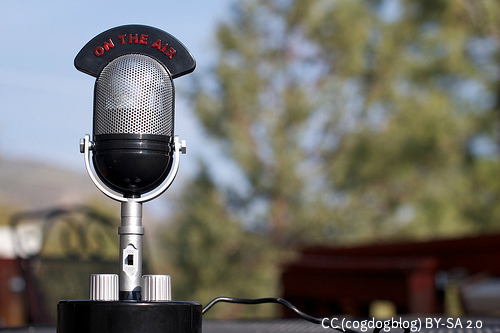WIPO Favoring the Adoption of a Treaty for Broadcasting Organizations
by Digital Rights LAC on March 1, 2014
From 16th to 20th of December, 2013 took place the 26th Session of the Standing Committee on Copyright and Related Rights (SCCR26) at World Intellectual Property Organization (WIPO), Geneva, Switzerland. A session devoted to discussing international instrument proposals for broadcasters, libraries and archives, and educational and research institutions.
By Amalia Toledo
The SCCR26 had an extensive and exhausting session that ended shortly before midnight on Friday December 20th, leaving us with the general feeling that WIPO is ready and willing to move fast in the adoption of a binding treaty for the questionable copyrights protection of broadcasters. Instead, the protection of the public interest seemed shy and reluctant. That is, any future instrument for libraries and archives –not even mentioning educational institutions– will require an unprecedented momentum that, for now, is not palpable.
Draft Broadcasting Treaty
The draft broadcasting treaty, in our view, born with a major setback: the scope (discussion topic at the December session). According to the draft treaty, the scope of this instrument would be the protection of the signal transmitted by broadcasters, cablecasters, and potentially webcasters; a new “right” that would extend the protection for a period of 50 years. But perhaps is even more critical that this new “right” would affect the use of copyrighted content or works for which, in many cases, the broadcaster has no copyright. Thus, the treaty could dangerously affect free speech and innovation on the Internet. Consider, for example, a work in the public domain that is broadcasted by a broadcasting organization. Due to the “protection” that would create this treaty, that organization could prohibit the retransmission of such work whose copyright has expired, preventing any user to reboradcast such content even for their personal use.
As already mentioned, this draft treaty is discussed at rapid pace with a view toward holding a Diplomatic Conference in 2015, where its adoption could be definitive. Beforehand, the Member States have to agree on whether the treaty will include or not all forms of webcasting or just the one produced by traditional agencies. From civil society, the public interest and consumers, the scenario is not encouraging. The vast majority of Member States are favoring this treaty, being prominent Mexico and Colombia as their great champions in Latin America. And at the plenary, there are very few organizations that present an alternative and/or non-conformist point of view. In this context, however, we highlight the International NGO Knowledge Ecology International (KEI), which has been emphatic in stressing that the need for this treaty has not yet been demonstrated, nor its economic implications. A claim that is not petty, considering that the draft treaty is contrary to copyright itself, since the right’s object is the transmission signal, but not the works it contains.
In such a picture, civil society’s alternative will be to call attention for the potential adoption and implementation of this draft treaty at the national level.
Guarantees for libraries and archives
The SCCR26 received with less keen the discussion of an instrument that would recognize the rights of libraries and archives to copy, lend, preserve, etc., documents and works. Basically, an instrument that would allow libraries and archives fulfill their mission within the law.
However, and in contrast to the previous point, during the two days devoted to this subject, different perspectives informed the debate. The position of the developed countries and rightsholders organizations was clearly identifiable: the mission of libraries and archives is unquestionably significant, but there is no need to create a new binding legal instrument. They argued that the international legal framework was good enough. Instead, they offered less legal measures: experiences exchanging, technical assistance and cooperation. The European Union, meanwhile, presented the more radical locus: favoring licensing.
On the other hand, those who promote a binding treaty comprise mostly the Latin American and African States, along with civil society organizations representing the public interest and calling for a human rights approach. Within this group, it was common to hear that the newly approved Treaty of Marrakesh is an example of how international law can remedy inequities created by copyright. In a fact sheet prepared by the International Federation of Library Associations (IFLA), it is evidenced the prevailing imbalance in international copyright treaties: 7 instruments that benefit rightsholders vis-à-vis a single treaty favoring the pubic interest.
The group also pointed out that international law is a tool to adjust and influence national law; therefore, a treaty of this kind is paramount. In this sense, Karisma Foundation did not only have the opportunity to express the concerns of Colombian libraries and archives, but also called the attention on how trade agreements between States are eroding national capacities to implement their own legislations.
In summary
Undoubtedly, the debate is now open for the draft broadcasting treaty. The year 2014 will witness a desperate and algid discussion about the “rights” of broadcasters. The next session’s agenda, to be held from April 28th to May 2nd, was agreed as follows: 2.5 days for broadcasters, 2 days for libraries and archives, and a half day for educational institutions. Yet, it appears that the delegates in favor of the broadcasting treaty will try to get away with it, decreasing the discussion time for libraries and archives in a day and a half; an adverse situation for advancing the work document on libraries and archives.
Karisma Foundation hopes to return to WIPO in order to continue supporting the development of a future instrument for libraries and archives, and to make a stance that a broadcasting treaty is a threat to our most basic human rights.






